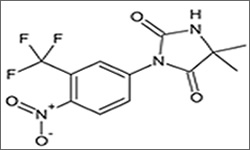Nilutamide

Nilutamide competes with male sex hormones (androgens) for the binding to androgen receptors, and blocks the activity of the male sex hormone testosterone. Testosterone can stimulate the growth of both normal and malignant prostate cells. The drug blocks the effects of the hormones on cancer cells, removing the growth stimulus. Because of the way it works, nilutamide is called an 'androgen antagonist', a type of hormonal cancer treatment.1
The molecular structure above is the 3D conformer Nilutamide.
- 1 Chu, E., & DeVita, V. T. (2015). Physicians' cancer chemotherapy drug manual 2015. Burlington, MA: Jones & Bartlett Learning.
Common side effects include constipation, dizziness, hot flashes, and visual changes (in up to 60% of patients). If you experience yellowing of the skin or eyes, nausea, vomiting, stomach pain, pain in the upper right part of the stomach, extreme tiredness, loss of appetite, flu-like symptoms, or dark urine call your doctor immediately as these side effects may be serious. Nilutamide may also cause lung disease so tell your doctor if you have ever had any type of lung disease. If you experience shortness of breath, cough, chest pain, or fever, stop taking nilutamide and call your doctor immediately.1
- 1 Chu, E., & DeVita, V. T. (2015). Physicians' cancer chemotherapy drug manual 2015. Burlington, MA: Jones & Bartlett Learning.
